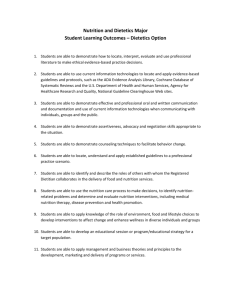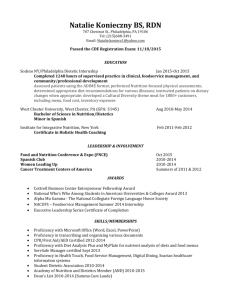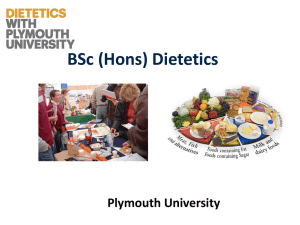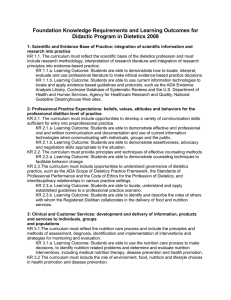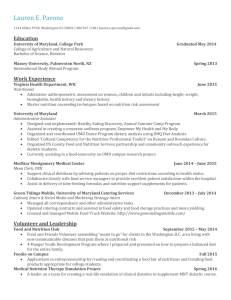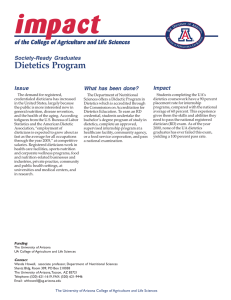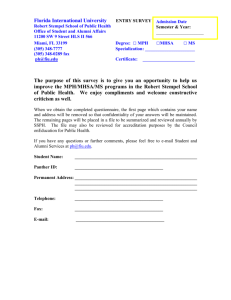Program Review Planning and Review Committee 2004-05 I. Degree: Program Director:
advertisement
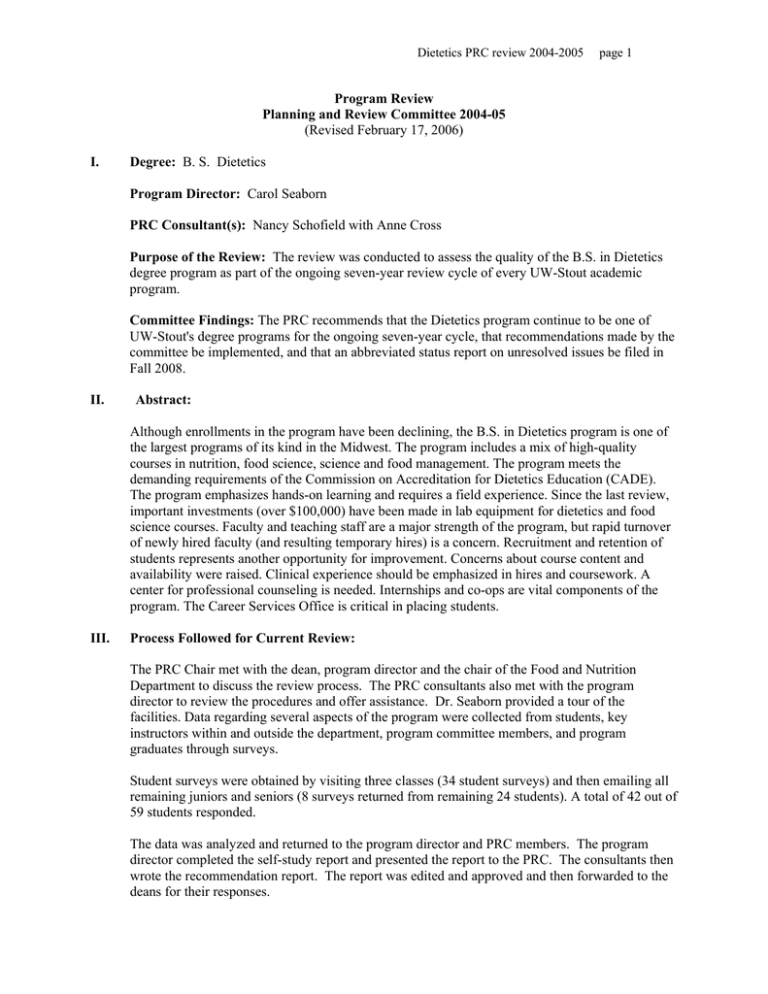
Dietetics PRC review 2004-2005 page 1 Program Review Planning and Review Committee 2004-05 (Revised February 17, 2006) I. Degree: B. S. Dietetics Program Director: Carol Seaborn PRC Consultant(s): Nancy Schofield with Anne Cross Purpose of the Review: The review was conducted to assess the quality of the B.S. in Dietetics degree program as part of the ongoing seven-year review cycle of every UW-Stout academic program. Committee Findings: The PRC recommends that the Dietetics program continue to be one of UW-Stout's degree programs for the ongoing seven-year cycle, that recommendations made by the committee be implemented, and that an abbreviated status report on unresolved issues be filed in Fall 2008. II. Abstract: Although enrollments in the program have been declining, the B.S. in Dietetics program is one of the largest programs of its kind in the Midwest. The program includes a mix of high-quality courses in nutrition, food science, science and food management. The program meets the demanding requirements of the Commission on Accreditation for Dietetics Education (CADE). The program emphasizes hands-on learning and requires a field experience. Since the last review, important investments (over $100,000) have been made in lab equipment for dietetics and food science courses. Faculty and teaching staff are a major strength of the program, but rapid turnover of newly hired faculty (and resulting temporary hires) is a concern. Recruitment and retention of students represents another opportunity for improvement. Concerns about course content and availability were raised. Clinical experience should be emphasized in hires and coursework. A center for professional counseling is needed. Internships and co-ops are vital components of the program. The Career Services Office is critical in placing students. III. Process Followed for Current Review: The PRC Chair met with the dean, program director and the chair of the Food and Nutrition Department to discuss the review process. The PRC consultants also met with the program director to review the procedures and offer assistance. Dr. Seaborn provided a tour of the facilities. Data regarding several aspects of the program were collected from students, key instructors within and outside the department, program committee members, and program graduates through surveys. Student surveys were obtained by visiting three classes (34 student surveys) and then emailing all remaining juniors and seniors (8 surveys returned from remaining 24 students). A total of 42 out of 59 students responded. The data was analyzed and returned to the program director and PRC members. The program director completed the self-study report and presented the report to the PRC. The consultants then wrote the recommendation report. The report was edited and approved and then forwarded to the deans for their responses. Dietetics PRC review 2004-2005 page 2 On January 27, 2006 the PRC accepted the deans’ responses and decided to require an abbreviated status report on unresolved issues to be filed in three years. IV. Previous Review: 1997 Recommendations for the program director, department chair and dean, followed by the program director’s response to those concerns (#5 followed by consultant’s note). 1. The dean should make every effort to ensure that this program has consistent, stable leadership over the next several years. Program director’s response to 1: The newly appointed program director who submitted the last 1997 PRC report is still in place and is writing the 2005 PRC report. 2. The need for faculty with expertise in nutritional counseling/education/wellness, the business/financial aspects of the dietetics field, and management of food service should be considered when hiring new faculty. Program director’s response to 2: The hiring of Dr. Charlene Schmidt in 2003 addressed this issue as she has 14 years in clinical nutrition and food management experience in elderly care. She has considerable training in counseling. 3. Current faculty members should be encouraged to seek re-training in nutritional counseling/education/wellness, management of health care and management of food service. Faculty members should also be provided with opportunities to update their clinical experience on a regular basis. Program director’s response to 3: Dr. Charlene Schmidt is currently seeking certification in counseling. Carol Seaborn attended 2 semesters of diet therapy at University of MN, however, applications to professional development were turned down, as the education was only designated for those seeking the Ph.D. degree and the $2,400 was paid out of pocket. Several faculty members have been funded from departmental funds to attend the annual meeting of the American Dietetic Association. Most faculty members have been awarded at least one opportunity for updating their content skills. 4. The program director and key faculty members need to review the curriculum to ensure that the program meets the new standards required by The American Dietetic Association. This process may involve revising courses and/or the program requirements. Program director’s response to 4: The program was revised and new courses added in 199899. The [ADA accreditation] program review occurred in 2000 with excellent comments from all reviewers. 5. The program director, department chair and the dean should identify resources to obtain new equipment and replace older equipment in the laboratories used for dietetics courses. Program director’s response to 5: More than $100,000 of equipment has been purchased in past two years in the food science. A nutrition assessment lab mod $42,000 was obtained and is currently used in for many of the dietetic courses. A human performance lab mod was also recently obtained and equipment is being purchased. A bone sonimeter was purchased for $10,000 to measure bone density. Consultant’s note to 5: These purchases and lab mods have had an impact. There were no negative student comments concerned with the facilities. It should be noted that keeping laboratories updated is a never-ending effort. Dietetics PRC review 2004-2005 6. V. page 3 The program director and key instructors should review current library holdings. Resources needed should be identified to the university’s Library Collection Development Office. Consider specific journals to be added to the library resources as detailed in the program director’s self study. Program director’s response to 6: The faculty along with library personnel has withdrawn library holdings that were severely outdated. Purchasing journals in the medical field have been problematic as these journals are very expensive and do not come in Internet accessible format. The fact that they are not on-line is a problem. Program Review: A. Program Strengths 1. Faculty and teaching staff - Survey results clearly indicate that faculty and teaching staff are a major strength of the program. Of the 42 students who responded, 31 mentioned professors, teachers, advisors or instructors as positive aspects of the program. “Educators have been very helpful and are very knowledgeable in their field. They have always been able and willing to assist (21a)”. “The diversity of the professor’s backgrounds and professional experiences, I feel, benefit the program and the courses (18a).” The current program faculty is from the Food and Nutrition, Chemistry, Biology, and Hospitality and Tourism Departments. Four of the nutrition faculty hold Registered Dietitian status. Their excellent credentials provide a strong nutrition, food science, science, and food management background for students. 2. Program advisor - Dr. Carol Seaborn is clearly respected and appreciated by students, advisory board members and instructors. “Carol Seaborn is a major strength. She works so hard and is always there for her students. She really makes the program worthwhile because of how enthusiastic and helpful she is (student 13a).” “ Dr. Seaborn’s vision, hard work, determination and care/passion for the program (key instructor within department 1).” “Strong leadership from Dr. Seaborn. She is excellent! (advisory committee member 1).” 3. Curriculum - The rigorous curriculum in nutrition, food science, science, and food management meets the demanding requirements of the accreditation by the Commission on Accreditation for Dietetics Education (CADE). The emphasis on hands-on learning and problem-solving skills is valued by students. The field experience requirement is an important feature. 4. Facilities – Program facilities are an asset to the program in particular in comparison to other programs across the country. B. Issues of Concern Curriculum 1. The H&T courses, in particular the Quantity Food Production course - Six of the 42 students and one advisory board member complained about H&T courses in general and questioned their relevance. For example: “H&T courses… are unnecessary and a waste of our time (16a).” Eight of the 42 students, one instructor, and one advisory board member Dietetics PRC review 2004-2005 page 4 complained about Quantity Food Production in particular, questioning the quantity of work, high stress and relevance to degree. Dr. Seaborn has indicated that H&T courses cover a significant portion of competencies required for accreditation. The Quantity Food Production course has been modified this semester to decrease the number of meals and increase the number of students in the team responsible for planning and carrying out the meal. 2. Revision of courses - Students complained (11 comments) that certain courses were “packed too full with content” and suggested that the content could be spread over more than one course. Nutrition courses were most often cited. Dr. Seaborn has begun the process of such revisions of courses and will consider others. 3. Lack of clinical experiences – Hands-on aspects of the program were clearly valued and students asked for more (11 comments). “Try to incorporate more hands-on experiences in classes, besides labs. Maybe more of the clinical side of dietetics, more emphasis on charting, reading medical labs and knowing medications (32a).” - In comparison to other dietetic programs across the country clinical experiences are lacking in courses. The need for more coursework in counseling and interpersonal skills, including leadership, was mentioned by the program director, instructors, students and employers. Teaching and Staffing 4. Clinical Experience – The need to hire trained faculty with clinical nutrition experience has been hindered by the loss of a full-time position. 5. Content Training – Periodic retraining and faculty development is needed in areas of clinical nutrition, nutrition assessment, management, nutrition counseling, health care delivery, human performance and wellness. 6. On-line and teaching improvement – Training is also needed in the delivery of on-line courses and improvement of education methods. 7. Rapid turnover of newly hired faculty – Concerns about positions being filled by temporary lecturers, lack of sufficient staff to advise students, lowering of quality of instruction and coordination of content were noted by the program director. The climate in the department should be considered. Alumni survey indicates dissatisfaction with temporary personnel. 8. Student advisement – Involvement in advisement is unevenly distributed among faculty. In addition to commitment to share the load, training may be needed. 9. Chemistry instruction – Program director noted additional resources are needed to staff organic chemistry and biochemistry courses. Student surveys indicate that being able to schedule these courses is a problem. 10. Accreditation – Program director needs sufficient support to complete the assessment report for CAADE and the self study, which must be completed in 2007. Secretarial support cuts have negatively impacted the program director workload. Dietetics PRC review 2004-2005 page 5 11. Career Services Office – Internships and co-ops are important parts of the program. Additional resources are needed for the Career Services Office to continue its important services. 12. Recruitment and retention of excellent students – Program enrollment has been declining. Both student recruitment and retention should be a priority. A member of the Advisory Committee indicated that the program should be marketed in a targeted campaign. Facilities 13. Continual updating of laboratory facilities 14. Professional counseling center – The continuing need for individual rooms with camera hookups and feed to central location is not being met. The existing counseling center is apparently unavailable. Such a facility would support courses such nutrition education, gerontology and sports nutrition. Other departments have indicated interest in sharing the lab. 15. Additional library and software needs have been identified by the program director. VI. Recommendations A. Recommendations for the Program Director 1. Address concerns of overlapping courses, “packed courses,” and the need for increased clinical experiences. Develop timeline for the next program revision. 2. Follow-up on revision of QFP course. 3. Investigate problems in class scheduling. Consider having the mathematics courses be taken earlier in the program. 4. Initiate the development of the professional counseling center. 5. Focus on the recruitment and retention of excellent students. 6. Consider a targeted marketing campaign. B. Recommendations for the Chair of the Food and Nutrition Department 1. Provide needed support of program director for coming accreditation process in 2006 release time and secretarial support as needed. 2. Facilitate the distribution of the advisement load across department members. 3. Continue to work for needed faculty positions and to emphasize clinical nutrition experience in future hires. 4. Provide support and encourage periodic retraining and faculty development in areas of clinical nutrition, nutrition assessment, management, nutrition counseling, health care delivery, human performance and wellness. 5. Provide and encourage training for faculty and instructional staff in the delivery of online courses and the improvement of education methods. 6. Address the rapid turnover of newly hired faculty and concerns about positions being filled by temporary lecturers. 7. Focus on the recruitment and retention of excellent students. 8. Consider a targeted marketing campaign. Dietetics PRC review 2004-2005 page 6 9. Provide support for the development and maintenance of the professional counseling center. 10. Continue to update laboratory facilities. 11. Obtain software identified by the program director. C. Recommendations for the Dean, College of Human Development 1. Advocate for additional resources for Career Services Office to continue their needed services. 2. Focus college efforts on the recruitment and retention of excellent students. 3. Consider a targeted marketing campaign. 4. Provide facilities and support for the needed professional counseling center. 5. Provide support to keep laboratory facilities up to date. D. Recommendations for the Dean, College of Arts and Sciences 1. Chemistry instruction – Provide sufficient resources to permit Dietetics students timely access to physiology, organic chemistry and biochemistry courses. E. Required status report – due December 1, 2008 The status report will consist of the applicable college or office responding to the following questions during the Fall of 2008. The program director of the Dietetics Program is asked to answer all of the following questions. If an issue has not been resolved, the relevant dean will be asked to submit an explanation for that question. 1. Questions concerning College of Human Development What is the status of the requested professional counseling center? Where is it located? Is it adequately furnished (including equipment)? Is there sufficient support and staff for operation? Describe how the facility is being used. 2. Question concerning Career Services (Dean of Students) Is Career Services able to provide the needed support to assist Dietetics students in receiving competitive internship placements? 3. Questions concerning College of Arts and Sciences Are Dietetics students able to take the needed science courses in a timely manner? Are the needed courses offered at least once a year? Are there sufficient openings in these courses for the number of students who need to take it each year? BIO-234 Physiology and Anatomy for Health Sciences CHEM-125 Principles of Chemistry for Health Sciences CHEM-201 Organic Chemistry CHEM-311 Biochemistry
